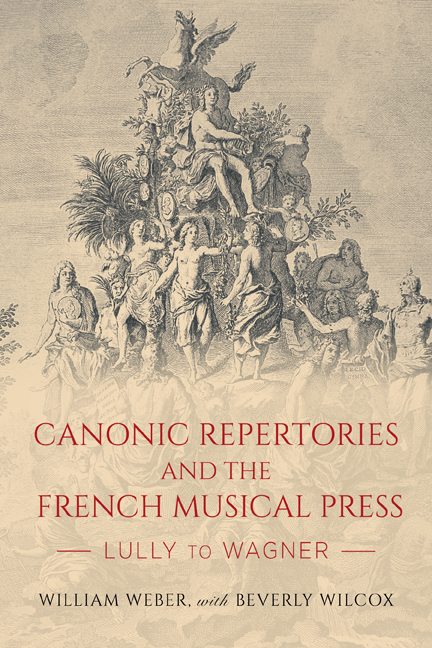Book contents
- Frontmatter
- Contents
- Acknowledgments
- List of Illustrations
- Introduction
- 1 The Domestic versus the Foreign in Eighteenth-Century Paris and London
- 2 Elements of Canon Formation at the Concert Spirituel (Beverly Wilcox)
- 3 To Praise or to Criticize? The Evolution of Music Criticism in Eighteenth-Century France
- 4 Haydn in the Press during the 1780s: How Did a Canon Arise?
- 5 Parallel Canons at the Opéra and the Comédie-Française at the End of the Ancien Régime
- 6 Negotiating Canonic Repertory and les progrès de la musique at the Paris Opéra, 1815–1830
- 7 The Evolution of le vieux répertoire at the Opéra-Comique in the Nineteenth Century
- 8 Richard Wagner, Concert Life, and Musical Canon in Paris, 1860–1914
- An Afterword
- Bibliography
- Index
1 - The Domestic versus the Foreign in Eighteenth-Century Paris and London
Published online by Cambridge University Press: 26 May 2022
- Frontmatter
- Contents
- Acknowledgments
- List of Illustrations
- Introduction
- 1 The Domestic versus the Foreign in Eighteenth-Century Paris and London
- 2 Elements of Canon Formation at the Concert Spirituel (Beverly Wilcox)
- 3 To Praise or to Criticize? The Evolution of Music Criticism in Eighteenth-Century France
- 4 Haydn in the Press during the 1780s: How Did a Canon Arise?
- 5 Parallel Canons at the Opéra and the Comédie-Française at the End of the Ancien Régime
- 6 Negotiating Canonic Repertory and les progrès de la musique at the Paris Opéra, 1815–1830
- 7 The Evolution of le vieux répertoire at the Opéra-Comique in the Nineteenth Century
- 8 Richard Wagner, Concert Life, and Musical Canon in Paris, 1860–1914
- An Afterword
- Bibliography
- Index
Summary
Musical culture in eighteenth-century Paris and London obtained a powerful dynamic from the interplay variously between old and new music and between works of domestic and foreign extraction. These factors worked out in diametrically contrasting ways: whereas the Opéra developed only works of French origin, many of them having been performed for over fifty years, the King's Theatre presented only operas developed in Italy, which rarely remained in repertory for more than five years. Yet in each place a separate opera company—the Opéra-Comique and the Haymarket Theatre—offered pieces chiefly of recent origin with spoken dialogue. Comparison of the institutions of the two cities can help explain the contexts and the forces which stimulated old repertories such as existed nowhere else in Europe. Whereas in Paris there emerged a repertory of old operas dating from the 1670s, in London the Academy of Ancient Music (1726) offered sacred pieces from the late sixteenth century. This chapter will lay out the conceptual and historical groundwork for understanding the guiding principles through which old works obtained canonic standing variously in Paris and London.
To define geographical identities different from the cosmopolitan, there are alternatives found in a variety of terms. Since it is problematic to speak of a national identity for culture until the last several decades of the eighteenth century, one might draw on such geographical identities as “local,” “regional,” and “domestic.” Michel-Paul Chabanon suggested a new vocabulary for defining conceptual location, chiefly the term “indigenous”: “In their free circulation, the arts lose all of their indigenous character; they transform that trait as they mingle it with foreign characteristics. In this regard Europe can be thought to be a mother country where all the arts are citizens.” The terms “national” and “the nationalistic” need also to be differentiated: Whereas a national identity functions basically as an internal identity—focused on the life of a community—a nationalistic one involves rivalry or conflict with other regions or states. These two tendencies can of course mingle in some contexts. National identities tend to be more deeply rooted historically than nationalistic ones but may need the ideology of the latter politically.
- Type
- Chapter
- Information
- Canonic Repertories and the French Musical PressLully to Wagner, pp. 16 - 36Publisher: Boydell & BrewerPrint publication year: 2021



